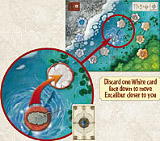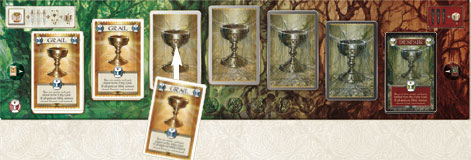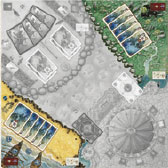

Camelot

Camelot has a specific Heroic Action attached to each of its two sections, the Round Table and the Siege area outside the fortress' walls.
When in Camelot, you may choose to perform a Heroic Action to: Draw 2 White cards Or Fight a Siege Engine.
Drawing 2 White Cards
There are no limits to the number of White cards you may have in your possession at any time during the game. But, if you have 12 or more White cards in hand, you cannot choose to draw any more additional White cards as your Heroic Action.
Fighting A Siege Engine
To fight a Siege Engine, first select and play as many Fight cards as desired from your hand onto the table. Then roll the 8-sided die:
If the sum of the White Fight cards you played is greater than the value displayed on the die, you win the fight; Move the Siege Engine off the board and back into Reserve and discard any cards played.
If the sum of your White Fight cards is lower than or equal to the value of the die you rolled, remove 1 Life point from your total by turning your Life dice down to its next lower value. If this brings you to zero, you die (see Losing a Life point, above). The Siege Engine remains in place and you must discard any cards played.

The Black Knight, Lancelot & the Dragon's Quests
The Tournament against the Black Knight, the Quest for Lancelot's Armor and the Dragon's Quest are Combat Quests.
When on a Combat Quest, you may, as your Heroic Action of choice, play a single Fight card on any empty card spot on the Knights'side.
The cards you play must eventually form a specific combination (2 pairs of distinct values in the Black Knight's Tournament, a full house in the Quest for Lancelot, and 3 three-of-a-kinds in the Dragon's Quest), so your choice of Fight cards may be limited, or may constrain future cards played here.
A Combat Quest ends the moment its last White (or Black, if in the Progression of Evil phase) empty spot is filled. The sum of all White cards played on the Quest is compared to the sum of the Black cards played there.
To protect the identities of both the innocent and a potential Traitor, all the Black cards that were played on the Quest must be shuffled together before revealing them to compute their sum.
If the White Fight cards have the greater total value, the Quest is won; otherwise it is lost.

The Quest for Excalibur

To win Excalibur, you must progressively move Excalibur to your side of the river.
To move Excalibur one spot closer to your side, you may, as your Heroic Action of choice, discard any one White card face down from your hand onto the White discard pile.
Once Excalibur reaches the last spot on your side of the river, the Quest is won, its victory spoils granted. Excalibur is placed on the Coat of Arms of the Knight who completes the Quest.

The Quest For The Holy Grail
To win the Holy Grail, you must cover every single spot on this Quest with a Grail card.
To progress in your search for the Holy Grail, you may, as your Heroic Action of choice, play a single Grail card on the first empty spot closest to the Holy Grail miniature.

If all card spots are filled, remove the closest Despair (or possibly Desolation) card instead, and discard both cards.
If you lay the 7th Grail card on the last spot on the board, the Quest is won, its victory spoils granted, and the Holy Grail goes on your Coat of Arms.

The Saxon and Pict Wars

To win one of the Saxon or Pict Wars you must complete a "straight" series of Fight cards with values from 1 to 5, before the Forces of Evil are able to place four Saxon or Pict figures in that war.
To fight the Saxons or Picts, you may, as your Heroic Action, play a single Fight card on the first available card spot in that War.
If there are no cards yet in play on that War, you must play a 1 as the first Fight card on this Quest. The value of each succeeding Fight card played must be exactly 1 point higher than the last card played, so that cards laid on the Quest form a "straight" of increasing values from 1 to 5.

Playing the fifth and final Fight card in a War wins that Quest. If four Saxon or Pict figures are placed on the battlefield before you play the fifth card, the Quest is lost.
Additional Heroic Actions: Sacrifice
Once per turn, you may decide to exert yourself beyond reason, sacrificing one of your Life points in exchange for a second Heroic Action. Immediately reduce your Life points by 1, and perform this second Action.
For instance, you could move to join the Quest for Excalibur using your first Heroic Action, then sacrifice a Life point to discard a White card and move Excalibur one space closer toward your side.
If such a sacrifice brings you down to zero Life points, you can find the inner resources required to perform this one final Action, but you will die immediately thereafter, regardless of this Action's outcome (i.e. even if this Action wins a Quest which would give you a new Life point). Only the Holy Grail could save you from certain death provided it had been won in an earlier Quest.
Additional Heroic Actions: The Knights, Special Powers
With the exception of Percival and Kay, all other Knights may only use their Special Power during their respective Heroic Action phase. Percival uses his during his Progression of Evil Phase, and Kay may use his out of turn, as soon as a Quest ends.
You may use your Special Power before or after your Heroic Action. If you choose to perform two Heroic Actions, you may even use your Special Power in between them.
The rule forbidding the same Heroic Action from being performed twice during the same turn remains in effect.
If, for instance, as Sir Galahad, you use your Special Power to play a free Special White card, you cannot opt to play a second Special White card as your mandatory Heroic Action during the same turn.
Continue Reading


